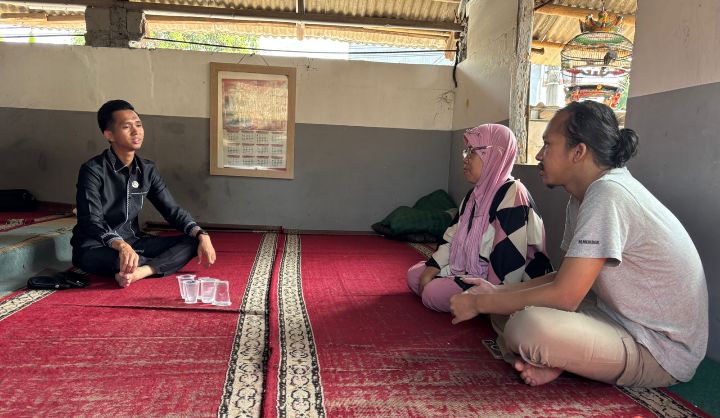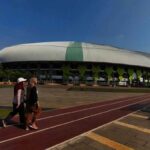BEKASI CITY – Angga Karidwansyah (24), a resident of Bantargebang sub-district, Bekasi City, who became a victim of human trafficking (TPPO) in Cambodia, has finally arrived safely in Indonesia. His return to his parents’ embrace was welcomed.
A visit was made to the home of Angga Karidwansyah (24) in the Bantargebang sub-district. This visit was conducted to hear the victim’s testimony firsthand and to push for concrete steps from the government to prevent similar cases from recurring.
“Today I had the opportunity to visit Mr. Angga, a resident of Bantargebang, who was just repatriated from Cambodia after falling victim to illegal migrant worker practices,” it was stated.
The exhaustion was still visible on his face. However, there was also relief, as he was finally able to reunite with his family in his homeland. Mr. Angga recounted that he left with good intentions to improve his economic situation but instead became trapped in fraud and exploitation.
“Thanks to the government for acting swiftly to repatriate Mr. Angga. However, this incident serves as a reminder to us all that protection for migrant workers must be strengthened. Authorities need to firmly crack down on illegal recruitment syndicates, and local governments must provide education and support from the outset,” it was said.
Angga was previously known to work at a restaurant in Jakarta and could return home to Bekasi once a week, so his parents were unaware that he later went to work as an illegal migrant worker in Cambodia, lured by the promise of a high salary.
“We are increasingly worried about cases where people die, leaving only their names behind,” was stated after the visit to Angga’s residence.
Two important messages were conveyed to the public. First, residents who wish to work abroad are urged to be more selective in seeking information about placement companies and to ensure all procedures are legal and go through official government-designated agencies.
“Secondly, and equally important, we ask for the government’s role, specifically the Bekasi City Government, to be more vigilant and to have concrete steps to mitigate similar incidents in the future,” it was emphasized.
Some of the steps being pushed include creating an education scheme about working abroad in every sub-district, establishing information and complaint posts for migrant workers at the Manpower Office (Disnaker), and, most importantly, providing expanded job opportunities and fostering a conducive climate for SMEs.
The importance of labor training that matches market needs was also stressed, not just focusing on fields like AC servicing or welding. A push was made for the Bekasi City Manpower Office to improve its performance.
“The Manpower Office should not just run programs; it must also level up, not remain at a C grade. Because the basic issue of leading the sector to reduce unemployment lies with that office,” it was concluded.
Bantargebang sub-district
Bantargebang is a sub-district in Bekasi, Indonesia, best known as the location of Bantargebang Integrated Waste Treatment Site, one of the largest landfills in Southeast Asia. It began operations in the 1980s and has since become a critical, yet environmentally challenging, waste management facility for the Jakarta metropolitan area.
Bekasi City
Bekasi City is a rapidly developing industrial and residential area located in West Java, Indonesia, just east of Jakarta. Historically, it was part of the ancient Tarumanagara and Sunda Kingdoms, with its name derived from the Sanskrit words for “cow” and “sand.” Today, it is a major component of the Jakarta metropolitan area, known for its large manufacturing sector and massive population growth.
Indonesia
Indonesia is a Southeast Asian archipelago comprising over 17,000 islands, with a rich history shaped by powerful Hindu-Buddhist empires, the spread of Islam, and European colonization, notably by the Dutch. It is a culturally diverse nation known for its ancient temples like Borobudur, vibrant arts, and as the world’s most populous Muslim-majority country.
Cambodia
Cambodia is a Southeast Asian nation with a rich cultural history, most famously as the home of the Khmer Empire. The empire’s peak is symbolized by the magnificent temple complex of Angkor Wat, constructed in the 12th century. The country’s more recent history includes the devastating Khmer Rouge regime of the 1970s.
Jakarta
Jakarta is the capital and largest city of Indonesia, located on the northwest coast of Java. Founded as Sunda Kelapa in the 4th century, it later became the Dutch colonial capital of Batavia in the 17th century before being renamed Jakarta after Indonesia’s independence. Today, it is a bustling, sprawling metropolis that serves as the country’s political and economic center.
Bekasi City Government
The Bekasi City Government administers Bekasi, a major industrial and residential hub in West Java, Indonesia. The area has a long history, originally part of the ancient Tarumanagara kingdom, before it was formally established as an autonomous city, separate from the larger Bekasi Regency, in 1997.
Manpower Office (Disnaker)
The Manpower Office (Disnaker) is a government agency in Indonesia responsible for employment services, labor market information, and worker protection. It was established to implement national manpower policies, facilitate job placement, and help regulate industrial relations. Its history is tied to Indonesia’s efforts to develop its workforce and manage labor affairs since the country’s independence.
Bekasi City Manpower Office
The Bekasi City Manpower Office is a local government agency in Bekasi, Indonesia, responsible for implementing national manpower policies and programs at the municipal level. It was established to serve the city’s large industrial workforce, which grew significantly following Bekasi’s rapid development as a major manufacturing hub in the late 20th century. Its primary functions include workforce placement, labor dispute resolution, and overseeing the development of vocational training programs.






